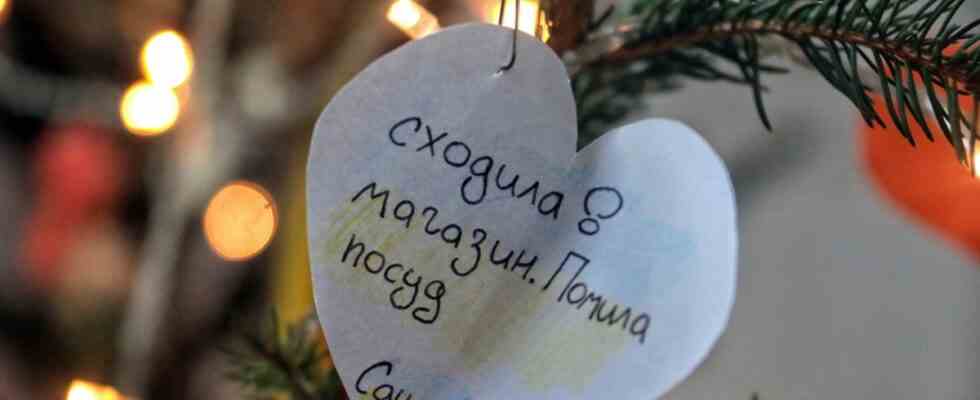Actually, it should be a joy if you can celebrate Christmas twice in quick succession: once Christmas Eve according to the Gregorian calendar on December 24th, another time according to the Julian calendar on January 6th. Meanwhile, Vasylyna Trypolska and her 16-year-old daughter Liuba don’t feel like celebrating. How are they supposed to celebrate the feast of Jesus’ birth with joy in their hearts when death is omnipresent in their homeland, Russian rockets are falling every day and they have to expect the worst every time they call home? “A new joy has come that has never existed before” – this Ukrainian Christmas carol does not reflect the state of mind of the two at the moment.
The mother and her daughter are among the 160 people who fled Ukraine and found temporary accommodation in the Pullach community. Since March of this year they have been living with Mayor Susanna Millennium. She is sitting at the table, as are Otto Horak and Barbara Kammerer-Fischer from the partnership association, when Vasylyna Trypolska reports on Ukrainian traditions at Christmas. Two landscape paintings hang on the wall in the living room, Christmas presents from daughter Liuba for Susanna Millennium.
Vasylyna Trypolska and her daughter Liuba have found refuge with Pullach’s mayor, Susanna Millennium.
(Photo: private)
According to a decision by the Verkhovna Rada, the Ukrainian parliament, Ukraine has celebrated Christmas twice since 2017. “To differentiate ourselves from Russia,” says the 39-year-old, who comes from Selyschtsche, a town of 700 people near the town of Baryschivka, with which the Pullach community has had a partnership since 1990. “Christmas was always a good time for us,” says the petite woman with a wistful voice. Traditionally, people go from house to house and sing songs together. Children and young people dressed unusually festive, some would even wear masks. As a reward, they would get sweets or a little money.
“All day long we have guests, relatives, acquaintances, our friends. Many children and my students come to us. They sing and tell poems. It’s so nice, the children bring joy to the house,” says Vasylyna Trypolska, who writes in her Heimat is a teacher for German and English and has been teaching her students online from Pullach since the Russian war of aggression, “if there isn’t another power outage in the Ukraine”. And as soon as the alarm sounds, she has to end the lesson immediately so that the children can take cover. For several months, the 39-year-old has also been giving German lessons to Ukrainian children at the Otfried-Preußler-Gymnasium. Her younger sister Olha, who lives with her daughter Maria in a United Initiators company apartment, teaches English at the Pater Rupert Mayer Day Care School.
This year on Christmas Eve at the house of thousand friends there was chicken, vegetables and red cabbage. According to the Orthodox Christian, one of the oldest Christmas traditions in Ukraine is the festive supper, with which twelve meatless dishes are served, because people fast until Christmas Day. “According to one version, the number twelve means the number of months in a year, according to another – the number of apostles. Everyone decides for themselves which option to stick to,” says Trypolska.
Kutya is a traditional Ukrainian Christmas meal made from wheat, nuts, honey and poppy seeds.
(Photo: Peter Hinz-Rosin)
What should never be missing is Kutja, “the most important dish”. Its ingredients consist of wheat, honey, chopped nuts, ground or crushed poppy seeds and raisins. They are said to symbolize hope and immortality, success, happiness and tranquillity. Wheat symbolizes the union of the world of the living and the dead. “After all, we believe that on this evening the spirits of the ancestors will come out of their world and wander through our streets,” says the 39-year-old. Many of the twelve dishes are symbol-laden, such as borscht with smoked and dried plums and mushrooms, symbolizing peace and harmony, or sitchenyky, pea patties, representing the tears of Our Lady shed for human sins.
Vasylyna Trypolska got to know Pullach when she was a girl, when she arrived here with 19 other children at the invitation of the municipality and was already living with Susanna Millennium and her husband Odilo Helmerich, who has since died. “The influence of my husband, who was a high school teacher, was decisive for Vasylyna taking up the teaching profession herself,” says Millennium friend about her guest.
Some gifts haven’t arrived yet, others got broken in the mail on the way
“It’s not an easy time for parents,” says the current teacher, whose daughter goes to high school in Pullach. Liuba received sweets on Christmas Eve. The actual gift didn’t arrive on time because the post office and shops weren’t open regularly because of the bombings at home. So she is waiting for three books that she has wished for. In a package that arrived on time, some gifts were broken. But not the present for your hostess Susanna Millennium, which she proudly puts on the table: a small box with wooden coasters.
In Ukraine Father Frost, as Santa Claus is called there, usually brings gifts on New Year’s Eve – in Russia on New Year’s Day. Giving and receiving presents are not very important to Vasylyna Trypolska and her daughter Liub this year anyway. They share their greatest wish with 43 million Ukrainian compatriots: peace. For January 7, at 1 p.m., the twinning association organized a Christmas party in the fire station – after the Orthodox Christmas.

